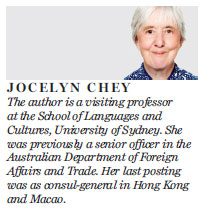Fight the blight of inequality to nourish the next generation
Updated: 2015-07-03 08:17
By Jocelyn Chey(HK Edition)
|
|||||||||
Ask the man or woman on the street what keeps them awake at night and, no matter whether it is Sydney or Hong Kong, you will find it is not the domestic political system or international terrorism but the struggle to make ends meet that looms in the small hours.
Thomas Piketty's Capital in the Twenty-First Century struck a chord around the world when it was published in 2013. This is because it highlighted the importance of the uneven distribution of wealth. Economists used to preach that inequality was necessary for capitalistic growth. In 2015 we are less sure. Even old-world economists admit that gross inequality slows growth because "unearned" - that is, undeserved - wealth remains confined to the privileged sector, and because returns on capital have been growing faster than gross domestic product and wage growth. As a consequence, whether in Hong Kong or Sydney, the older generation who own their own properties and shares are generally doing well. So are new wealthy immigrants. The younger generation, however, see their prospects of buying into the property market or saving for retirement disappearing.
The Gini coefficient, which measures income disparity, rose in Hong Kong from 0.43 in 1971 to 0.54 in 2011, up 25 percent, nearly equal to 0.55 on the mainland. Housing prices are now among the highest in the world, 30 percent more than those of New York in 2013. While 1.3 million Hong Kong people live under the poverty line, there is a record number of billionaires - 45 in 2014, according to the Forbes World's Billionaires list, with a combined net worth of HK$214 billion.
Chief Executive Leung Chun-ying, in an interview with the Financial Times in October last year, discussed the difficulties facing Hong Kong's young people. "An economy that grows at a high rate should provide the social mobility that young people deserve," Leung said. However, growth has slowed in the first quarter of this year, and is not expected to reach 3 percent until 2019, according to The Economist Intelligence Unit. Here is the problem.
Hong Kong is not unique in facing such economic challenges. Take Taiwan, for instance: There, the population is also aging, income disparity is increasing and the economy is stagnating. In Taiwan, as in Hong Kong, people are fed up with politicians who appear more focused on personal careers than on tackling long-term structural issues required to stabilize society. A study by Hong Ming-hwang of Chinese Culture University, Taiwan, going back to the 1980s, found that taxpayers with the top 1 percent of taxable incomes - a group of about 56,000 people - saw their incomes rise sharply. By the end of 2011, their average annual taxable income exceeded NT$10 million ($324,000). The remaining 99 percent of taxpayers saw incomes only edging slightly higher to an average in 2014 of approximately NT$800,000 a year. Taiwan now has the second highest concentration of income - after the US - at the top of the developed economies, ahead of Singapore, Britain and Japan.
What is the solution? One of Piketty's recommendations is an annual 2 percent global wealth tax. This might prevent the accumulation of outsized family fortunes and therefore inequality. Naturally, some would still get much richer than others, but the tax would normalize wealth levels after a decade or two. I am reminded of the biblical tradition of the Jubilee, in which lands and property must be returned to their original owners every 50 years, that is, within the lifetime of the owners. Although it would serve to restore equity and improve social stability, such a "Piketty tax" seems unlikely to be adopted.
A common Chinese proverb states that wealth does not extend beyond three generations. This has proved true for inheritors of great estates around the world, who have often squandered the money for which they never worked, and who are often then replaced by insightful and clever newcomers. It is also commonly appreciated in Chinese culture that education is the best pointer to future success in life and that genetic inheritance does not guarantee talent. The problem is that educational opportunities also depend on money. Rich families can afford to send their children to better schools and universities and, if necessary, they can borrow money at better rates than the poor.

(HK Edition 07/03/2015 page10)